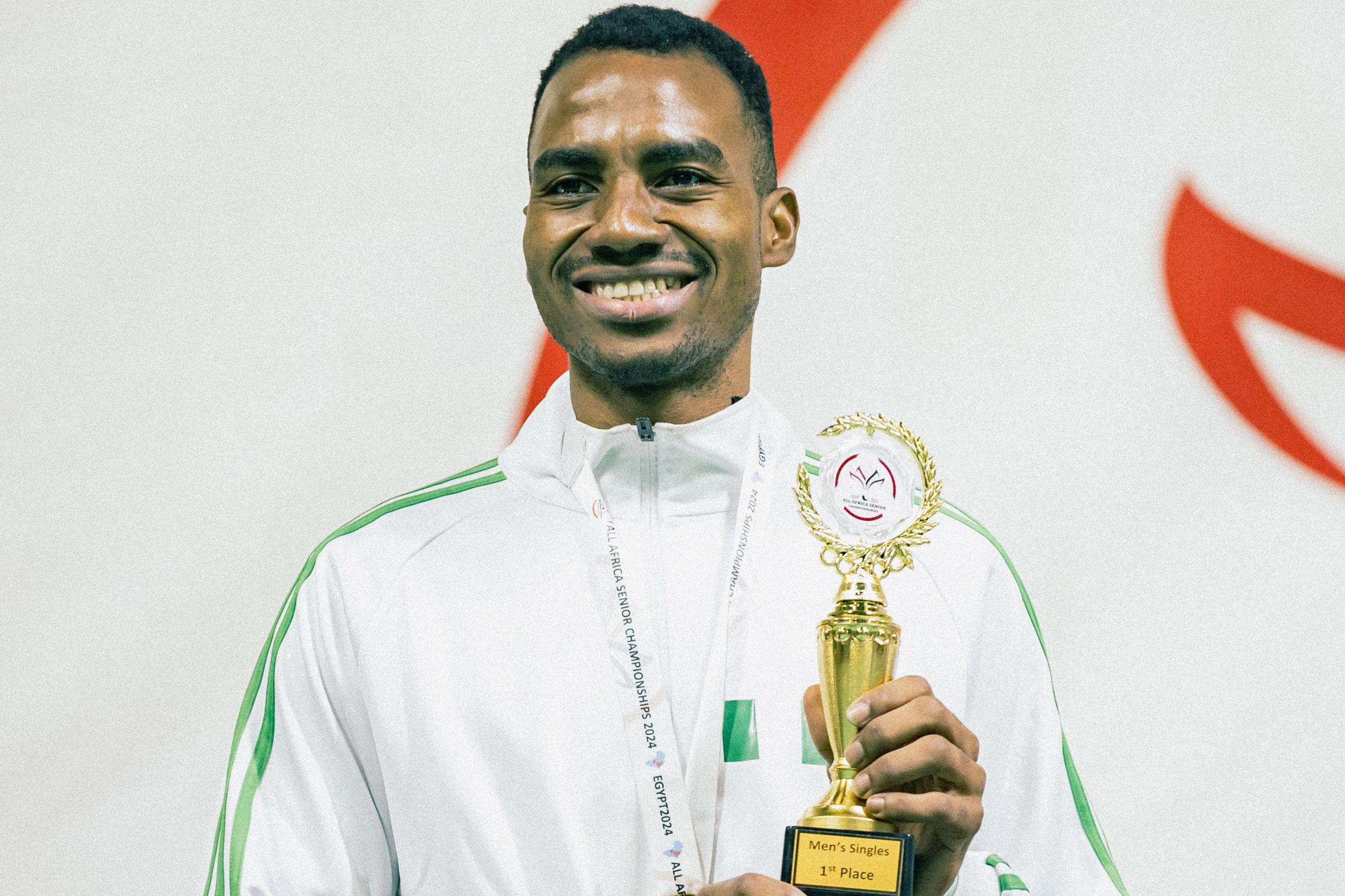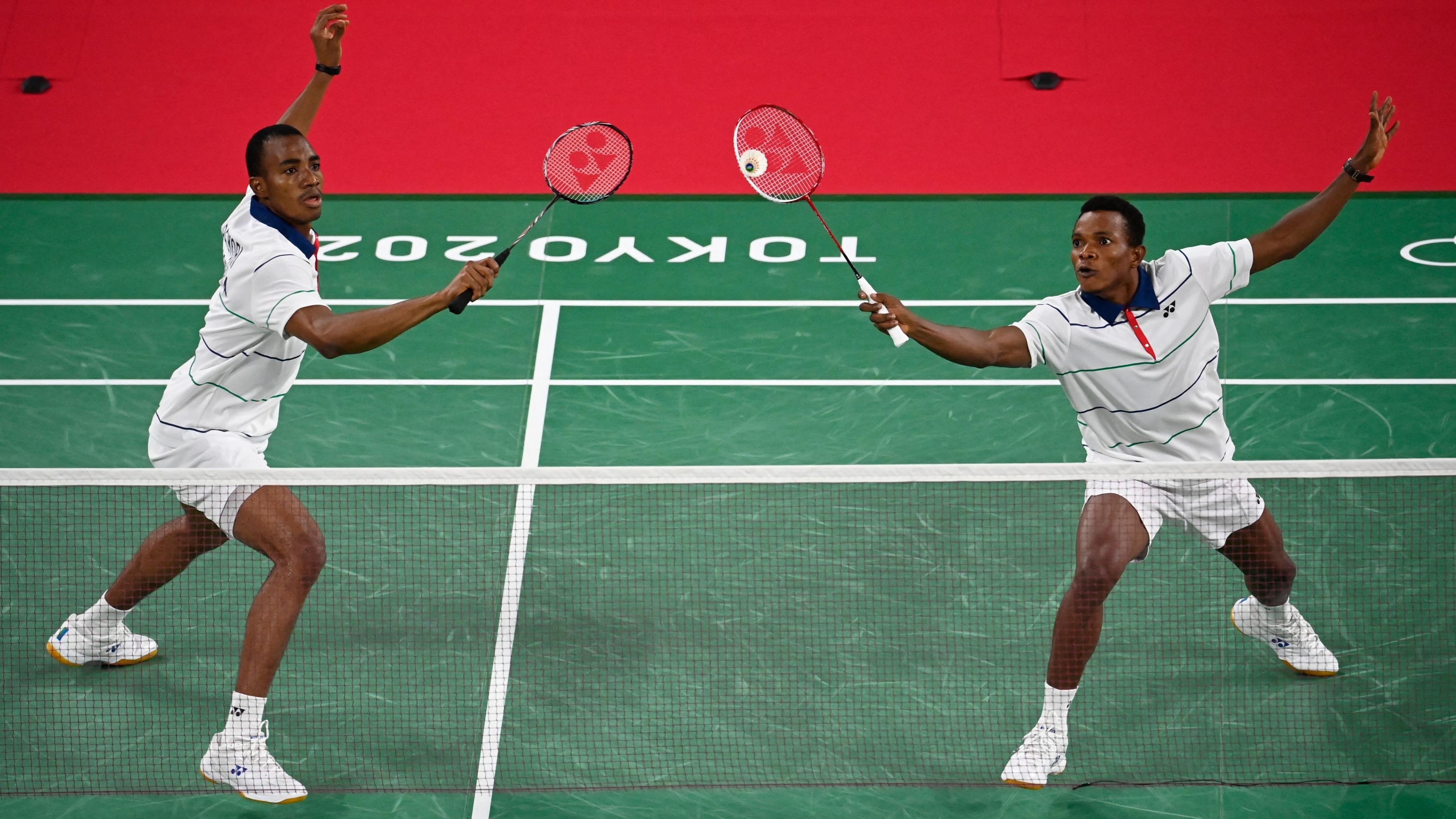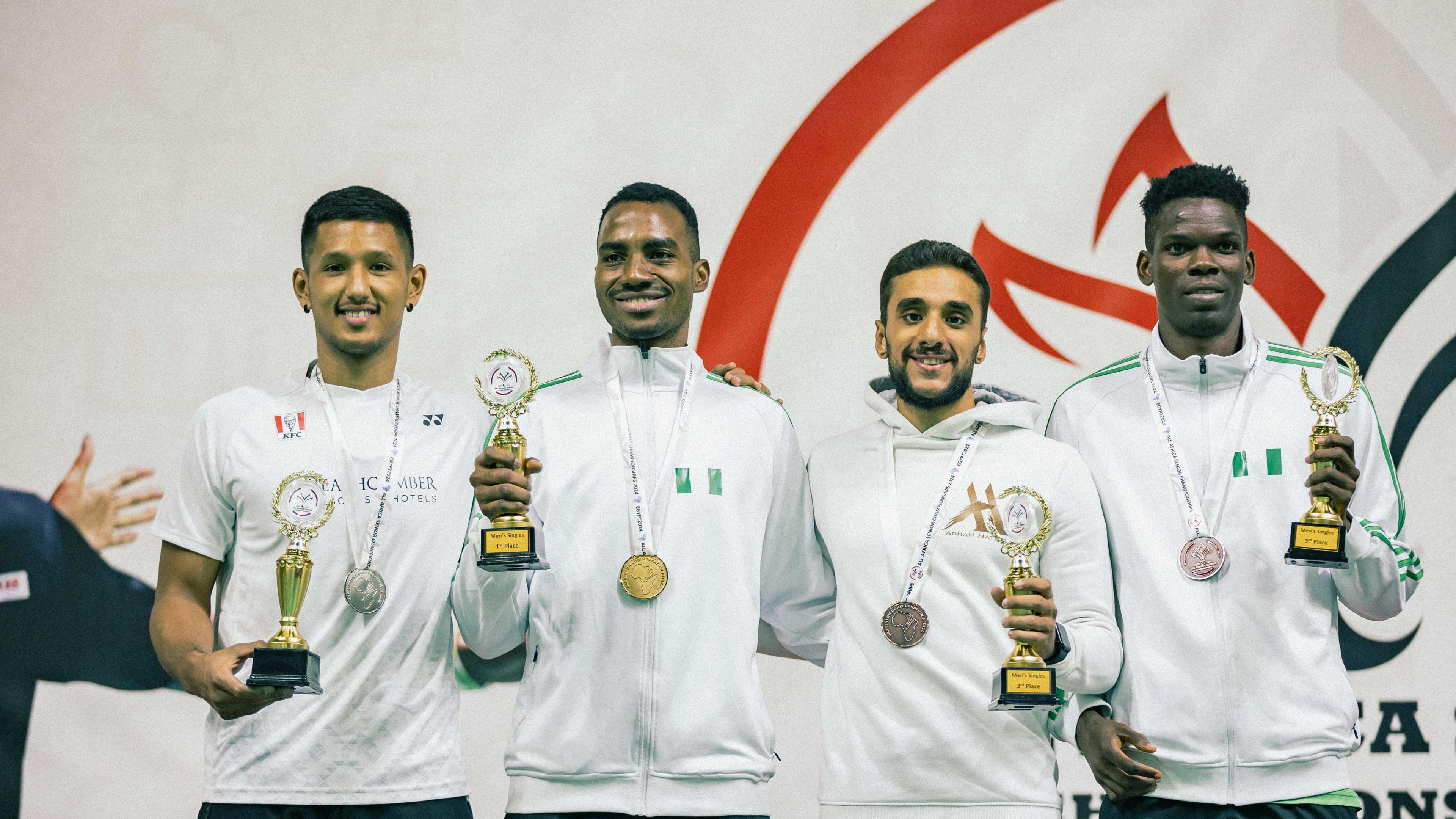The brothers out to end Africa's Olympic badminton jinx

Anuoluwapo Opeyori won his fourth continental singles titles at the 2024 African badminton championships in Cairo
- Published
As African badminton champion Anuoluwapo Juwon Opeyori prepares to make Olympic history for the continent in Paris, the Nigerian can take heart from knowing that he has regularly defied the odds.
For despite being born in an informal settlement in Nigeria’s biggest city Lagos, the 27-year-old has risen up to win four continental singles titles, more than any African man before.
What makes the feat all the more impressive is that he lives in a country without one badminton-designated facility, but nonetheless he is now hoping to become the first African to progress in the Olympic men’s singles competition.
“My target is to get to the quarter-final because once I’m able to win one game, I believe that will be a big upset for everyone and I should be able to achieve more than that,” Opeyori told BBC Sport Africa.
Not once since badminton became an Olympic sport in 1992 has an African man ever reached the next round, even if South Africa’s Jacob Maliekal did manage to win a game in the group stages of the 2016 Games when he beat a Ukrainian opponent only to fail to make the next phase.
Meanwhile, the continent’s record is marginally better in the women’s game where Hadia Hosny of Egupt knocked out a Mexican opponent in 2008 to actually reach the second round – the one and only time an African has achieved this in Olympic badminton singles history.
Despite the weight of history, Opeyori – who has won Africa’s last three singles titles as well as the African Games title earlier this year – is approaching the 2024 Games in confident mood.
“Technically-speaking, I’m not under pressure because I’ll be facing people that are very good. So they should be the ones under pressure because I’m coming for them. So it is a battle that I am taking to them.”
'Breaking African jinx'

Anuoluwapo Opeyori (left) alongside Godwin Olofua played in the men's doubles of the 2020 Tokyo games
Opeyori’s journey to the top of African badminton started in unexpected fashion – since he was actually playing Nigeria’s favourite sport at the time.
“I was playing football with my friends when the coach saw us,” he explained as he walked around the Rowe Park sport complex, where his journey began, in Lagos.
“I think he had very good insight because we were just normal kids playing football. But he introduced the game to us and immediately that he gave me the racket, I bonded with it.”
Despite having neither a racket nor shoes, with Opeyori borrowing both, a love had been born yet any hopes of rapid progress were further stymied by the limited badminton facilities in Africa’s most populous nation.
“It will amaze you to know that in Nigeria, we don’t have a single badminton facility – not one,” Francis Orbih, the president of the Badminton Federation of Nigeria, told BBC Sport Africa.
“In most public places, what you have is a multi-purpose hall – so that’s table tennis, badminton, gymnastics, boxing, basketball, handball etc. in just one hall. So when basketball has a two-week programme, badminton can’t train and that is a huge drawback.”
It was a trip to Asia in 2018 that changed Opeyori’s career, says Orbih.
For the year after attending a two-month training camp in Indonesia, a country that boasts eight Olympic badminton golds (and 21 overall), Opeyori won the first of his record four African men’s singles titles.
Having won the last three on offer, the African champion is now tipped to make his continent proud at the Olympics.
“If anyone is going to be able to break the jinx, it’s him – he has the capacity to do it,” says Orbih.
“He is disciplined, hardworking and passionate about the game, and that is what has brought him to where he is and kept him there.”
'A Family Affair’

Anuoluwapo Opeyori (second from left) celebrating with other medal winners at the 2024 African badminton championship in Cairo
Before he stepped onto the badminton court in a moment that changed his life, Opeyori had been conducting menial jobs near his Lagos home, such as bricklaying, just to get by.
He was also supported by the money raised from selling provisions by his mother Funke, who was delighted by his proposed career change.
“When he told me he wanted to play badminton, he was not aware that I used to play the sport,” Funke, a former amateur player, told BBC Sport Africa.
“Anytime he travels for competition, I am always happy and support him by fasting and praying because I am excited my son is so fortunate.”
“It means badminton run in the blood,” said Opeyori.
In fact, his career has become a family affair after his elder brother Funsho set aside his own badminton abilities nearly a decade ago to both train and fund his sibling.
“I gave up my dream because I saw good potential in him,” said Funsho.
“I’m excited because he is African number one and I’m very confident that he is going to break the jinx at the Olympics.”
Opeyori played at the last Olympics in the doubles, suffering a first-round exit, and will be one of just two African men in the badminton singles, along with Georges Julien Paul of Mauritius.
Meanwhile, fellow Mauritian Kate Foo Kune, who has also previously won a round-robin game at the Olympics but no more, will contest the women’s singles as will South Africa’s Johanita Scholtz.
Nonetheless, the traditional Asian dominance of the sport – combined with the challenges faced by Africa’s best players – means that achieving net gains in Paris is going to be an uphill task, one which Opeyori is relishing.
“I’m coming with good confidence and making the nation proud is my aspiration – and the whole of Africa also.”
Anuoluwapo Juwon Opeyori will begin his quest to make history at the Paris 2024 Olympics in Group N against Li Shi Feng (China) and Tobias Kunezi (Switzerland) in the group stage.